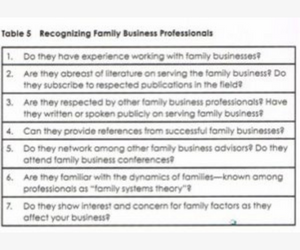Trust: How to Nurture a Key Factor in Family Success
TRUST: HOW TO NURTURE A KEY INGREDIENT FOR FAMILY SUCCESS
What does it take to be a successful multi-generational family business?
Dennis Jaffe, PhD is one of the best people to ask. For more than 40 years, he’s been both a leader and a pioneer in the field of family enterprise consulting.
If you find that he’s a speaker at one of the family business conferences, be sure to attend. Do this partly because you’ll come away with good ideas, but even more, because you’ll feel motivated to act on what you’ve heard. Jaffe inspires action, and the reason is, you feel he really cares and that he’s pulling for you.
What advice would he have for you today?
Successful Families Invest in Relationships
“Families that want to stay together as a business,” Jaffe begins, “need to invest in themselves as a family. It’s an incredible challenge that few families manage well.”
The challenges are complex, but one of the starting places is trust. He has an enlightening quote on the subject.
Trust is a name for the glue that makes people feel that they want to be part of a relationship.
Successful Families Need High Levels of Trust
When family members lose trust in each other, the glue that binds them together weakens or dissolves. “We withdraw our energy and level of engagement,” points out Jaffe. “We go on an internal strike.”
When trust is low, we limit our involvement. We limit what we are willing to do or share. And as he points out, “We say to ourselves, ‘This is as all I am willing to give.’ Internally, there is a calculus of trust where we punish by limiting what we give, and reward by giving more.”
How Do You Develop and Maintain Trust?
Interestingly, in Jaffe’s view, trust isn’t a feeling that you can turn on and off. Instead, there are very concrete things that people need to do to earn and maintain trust. These are:
- Be dependable. If you say you’re going to do something, do it. If don’t deliver, you can expect that you won’t be trusted.
- Be transparent. When a leader or an organization or a team shares what is going on, the other person feels more trust because they understand the circumstances. It’s human nature for people to assume the worst when they don’t know why something was done.
- Be competent. If people don’t think you are capable of doing what you’re supposed to do, they’re not going to feel trust in you.
- Be sincere and authentic. If people don’t believe what you say, they’re not trusting you.
- Be fair. Listen to all sides and act in ways that respect all sides. Unfairness breeds lack of trust.
How Do You Rebuild Trust If It’s Been Weakened or Lost?
It’s tricky because when someone has lost trust in you, they may not tell you. They may withdraw or disengage, and they may do this in ways that are subtle and even invisible to you.
To build or rebuild trust, a leader has to do more, in addition to following the five ingredients of trust already mentioned. The leader may need to open a conversation about the degree to which each of these qualities are present–or absent.
The leader needs to be open to hearing from the person on the other side and learning about what they feel, observe and need. Paradoxically, the leader will need at least some trust in the other in order to begin doing this.
When trust is lost, it is usually through an action (or inaction) where someone who felt vulnerable to another feels hurt. But something else may also be coming into play.
Often, in Jaffe’s experience, “There is a disconnect because the impact on a person may not reflect the real intention of the person who is felt to have done something to loosen trust. If you feel that someone has lost your trust, instead of withdrawing, share your hurt with the other person, and inquire as to what he or she meant by what has taken place.”
Jaffe has seen that this approach sometimes can repair the breach quite quickly as a misunderstanding is unraveled and communication deepens. Still, as Jaffe has seen, “Given the tendency to withdraw when one feels hurt, it may be difficult to motivate yourself to seek out the person who disappointed you. But a person able to do that is less frequently hurt.”
Jaffe deals with a myriad of other factors that help families become stronger. He has close to 20 books relating to family businesses, and you can find these on Amazon. He’s a sought after speaker at Family Business Conferences.
You can contact him at: djaffe@dennisjaffe.com. or visit: http://dennisjaffe.com
Search Articles
Latest Articles
Architect of Her Life
https://medium.com/@ken.roman_84029/architect-of-her-life-78e38401de71 Publication –medium.com
Meet Clara Kaluderovic
https://canvasrebel.com/meet-clara-kaluderovic Publication – canvasrebel.com
New Jersey drone sightings expose America’s battlefield blind spot
https://www.washingtontimes.com/news/2024/dec/23/new-jersey-drone-sightings-expose-america-battlefi Publication –washingtontimes.com
She Brews Hope and Resilience Even During War
https://foreignpress.org/journalism-resources/she-brews-hope-and-resilience-even-during-war Publication –foreignpress.org
Subscribe to Updates
About Author

Mitzi Perdue is the widow of the poultry magnate, Frank Perdue. She’s the author of How To Make Your Family Business Last and 52 Tips to Combat Human Trafficking. Contact her at www.MitziPerdue.com
All Articles
Family Businesses Can Learn from Military History
Family Businesses Can Learn from Military HistoryMilitary Culture My late husband was fascinated by military culture, and you could often find him reading the biographies of famous generals. His fascination stemmed from his interest in human motivation. He often...
Family Quarrels & Mediation–Pull Back from the Brink
Family Quarrels & Mediation– Pull Back from the BrinkI hope you’re not reading this because you’re up against a family quarrel. The pain of a family quarrel can permeate every hour of every day. The fallout has the potential of threatening everything we all hold...
What Family Businesses Can Learn From Military Culture
What Family Businesses Can Learn From Military CultureFor longevity and having an extraordinarily strong culture, few organizations can match our military. The military culture of our armed services began before the founding of our country, and it survives to this...
Four Sure-Fire Ways to Stand out in Your Career
Four Sure-Fire Ways to Stand Out in Your CareerA young man in a class I was addressing at a Columbia University business class asked me a poignant question. “How do I stand out in my career?” He was in his mid-twenties, professionally dressed, and his body language...
Family Stories Keep Families Together
Family Stories Keep Families TogetherJackie Kennedy Onassis once said: “If your children turn out well, nothing else matters. If your children turn out badly, nothing else matters.” Having the young people in your life turn out well is as important as anything else...
Choosing Your Family Business Advisors
Choosing Your Family Business AdvisorsKnow when you need to get help. People often ask me the secret of Frank Perdue’s success. He had to do hundreds of things right. He had to be able to see the big picture as well as be detail oriented. But there was something else:...






